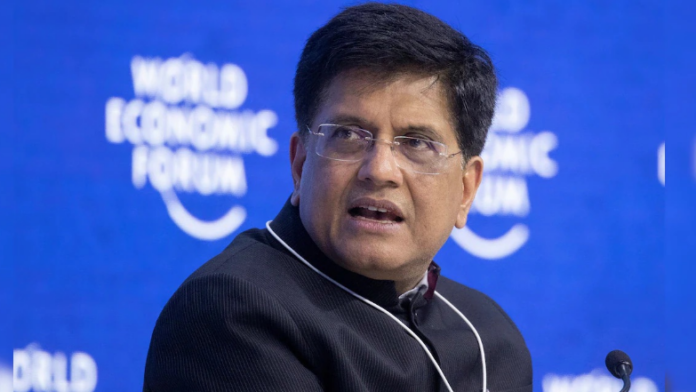Union Commerce Minister Piyush Goyal has come under fire from the Congress party after making a remark about India’s startup ecosystem, which sparked a heated debate across the country. Goyal was accused by the Congress of “misinterpreting” his comments, with the party accusing him of trying to create controversy unnecessarily. In response, Goyal firmly rejected these accusations, accusing the Congress of manufacturing the controversy and misrepresenting his message.
On Friday, Goyal addressed the media, defending his comments by stating that his remarks had been received positively by the country’s young entrepreneurs and the startup community. He explained that his message was meant to challenge the current trajectory of India’s startup ecosystem, which he believes is overly focused on certain sectors, such as food delivery services and fantasy sports. However, he accused the Congress party of failing to understand the real intent behind his message, and suggested that their reaction stemmed from a broader, more negative approach toward innovation and progress.
The controversy began the day before, when Goyal spoke at the “Startup Maha Kumbh,” an event aimed at promoting and supporting the startup ecosystem in India. During his speech, he made a pointed critique of the direction in which India’s startup ecosystem is headed. He drew a sharp contrast between India’s focus on food delivery services and entertainment apps, and the technological advancements made by countries like China. Goyal questioned the type of innovation that Indian startups were pursuing and raised concerns about the future of the country’s entrepreneurial ventures.
His comments resonated with a growing concern that India’s startup scene was overly concentrated in sectors like food delivery, online betting, and fantasy sports. Goyal went as far as to ask, “Do we want to make ice cream or chips? Are we just here for retail?” He emphasized the need for more meaningful, innovative work in India’s startup culture. He also questioned whether the country’s youth should settle for becoming delivery personnel in the gig economy, delivering food for the wealthy, or if this was all India’s startup culture could ever be.
“Is this India’s destiny? This isn’t startup culture—this is just entrepreneurship,” Goyal continued, urging entrepreneurs to look beyond low-margin businesses and focus on creating technology that could contribute to the country’s long-term progress. His speech suggested that India, as the world’s third-largest startup hub, with over 100 unicorns and approximately 1.57 lakh government-recognized startups, should aim for deeper, more impactful technological innovation.
While the Indian startup ecosystem is growing rapidly, with numerous successful ventures, Goyal raised the important question of whether these startups were truly advancing the country’s technological capabilities. He pointed out that many Indian startups today prioritize food delivery apps, which he argued simply transform unemployed youth into low-wage gig workers, offering a short-term solution rather than long-term technological progress.
In contrast, Goyal pointed to China’s emphasis on advanced technologies, such as semiconductors, artificial intelligence (AI), and electric vehicles (EVs), which he said were focused on building the country’s technological future. Goyal asked why India did not have its own large-scale AI models and compared this lack of deep-tech development with China’s progress. He also suggested that India had not yet built the kind of internet companies that would lay the foundation for such advancements.
The Congress party quickly reacted to Goyal’s remarks, with some leaders accusing him of acknowledging India’s startup struggles and exposing what they termed as the lies of Prime Minister Narendra Modi about the state of startups in India. The Congress claimed that Goyal’s criticism was a clear admission that the current government’s promises about supporting startups were not being met.
The reaction to Goyal’s remarks from various industry leaders was mixed, with many expressing their disagreement with the minister’s criticism of India’s startup ecosystem. Some prominent figures in the tech and startup world voiced their concerns over Goyal’s approach to supporting Indian innovation. For example, Aadit Palicha, the CEO of Zepto, emphasized the need for government support in nurturing local champions and pointed out that criticism of existing startups could demoralize teams that were already striving to drive technological revolutions in India. Palicha argued that these startups were taking risks and making significant efforts to bring change to the country, and they needed support, not undermining from the government.
Similarly, Mohandas Pai, a former executive at Infosys, cautioned against belittling Indian startups. He questioned what the government, including Goyal, had done to help deep-tech startups grow in India. Pai pointed out that it was easy for Goyal to criticize existing ventures, but he should instead focus on what could be done to foster more technological innovation in India. Pai’s comments reflect a larger concern that while the government has called for more innovation, the support and infrastructure needed to nurture deep-tech startups are often lacking.
Paytm founder Vijay Shekhar Sharma also weighed in on the debate, stating that India’s startup ecosystem is still maturing. Sharma pointed out that ecosystems like those in China and the United States are much more developed and have more resources to invest in deep-tech innovation. “When you are mature, you have resources, then you can play a longer arc game,” Sharma said, suggesting that India’s startup ecosystem, while growing rapidly, is still in the process of evolving.
Despite the criticism, some saw Goyal’s comments as a challenge to India’s engineers and technologists, rather than an attack on startups. Sridhar Vembu, CEO of Zoho, responded positively to Goyal’s call for more deep-tech innovation. Vembu saw it as an opportunity for engineers to rise to the challenge and make the necessary technological advancements to compete globally. He expressed optimism that India would eventually catch up to China in deep-tech innovation, provided there was more focus on developing smart engineers who could tackle the big challenges ahead.
Vembu also mentioned that India could achieve significant technological goals, such as curing diseases and advancing in areas like artificial intelligence and biotechnology, but this would require the kind of dedicated engineers who could drive these efforts forward. In his view, Goyal’s comments were not about criticizing the current startup scene but about pushing for more ambitious, long-term innovation.
In conclusion, while Piyush Goyal’s remarks about the Indian startup ecosystem stirred controversy and sparked debates within the political and entrepreneurial communities, they also raised important questions about the direction of innovation in India. Critics argued that Goyal’s focus on deep-tech development and his comparison with China’s progress were unfair and overlooked the significant strides Indian startups have made in sectors like food delivery and e-commerce. Others, however, saw Goyal’s comments as a challenge to India’s engineers and technologists to aim higher and focus on creating more transformative, long-lasting technological innovations. Regardless of the differing opinions, the debate highlights the need for a broader conversation about the future of India’s startup ecosystem and the role of government support in shaping its growth.





